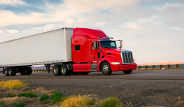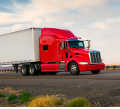Here’s a quick, simple question—answer it honestly, because your response could boost your entrepreneurial success: what is a profitable niche in a billion dollar industry that shows no sign of slowing down?
The answer is not the technology industry and the niche is not software development. It turns out that the best industry is supply chain management and freight trucking is a profitable niche. According to Technavio’s market research analysts, the worldwide logistics market is forecast to grow by about 7% by 2021.
Although you’ll be starting a new business along the lines of a traditional, industrial age business, the reason why this is a great entrepreneurial venture is that there is a continuous and never-ending demand for truckers to move freight from suppliers to manufacturers to wholesalers to retailers to consumers.
However, since the freight truck business is potentially profitable, the competition is fierce. Consequently, you have to have a good strategy to thrive in this industry.
After getting your trucking authority, here are 3 big rookie mistakes to avoid when starting your own trucking business:
1) Sidestep cash flow problems
One reason why many small truck companies go out of business within the first two years is not that of the competition. Although this is the most popular alibi, the real reason is cash-flow problems.
Since customers expect 30 to 60 days credit on their freight delivery order, this can quickly create a negative cash flow situation. Since you, as a business owner, are not getting paid immediately, you have to pay all your overhead—trucks, drivers, fuel, office, staffing, etc.—out of your own pocket. If you have a number of customers, you can see how this would quickly create a problem. You are paying to deliver freight to customers until they pay you back when the invoice is due. Moreover, should a customer delay their payment or fail to pay you at all, this could make a bad situation even worse.
The solution to this dilemma is to use freight bill factoring. A financial company will buy your invoices from you, injecting instant cash into your trucking business. In other words, you’ll get same-day funding. They will then collect the invoice from your customer when it comes due. Since you’ll get your money upfront, you’ll now be able to get new customers, grant credit terms, and haul more freight. And, of course, you won’t need to borrow a high-interest bank loan to pay expenses like permits, payroll, and fuel costs.
2) Buy your own equipment.
As a new owner, you will be presented with all sorts of temptations to not buy your own equipment. You will be approached by independent contract truckers who promise to take care of all equipment costs in exchange for a share of your profits. You will also be approached by equipment salespeople who will try to persuade you to lease all the equipment you need. Leasing works like a rental contract, where you pay a small amount each month for the equipment. These two options — and others like them — are tempting because it appears that you reduce your costs while still making some profit. However, if you can raise the funds to buy your own equipment, you will have total control of all your operations and earn higher profits in the long run.
3) Avoid Easy Marketing Fixes
Ultimately, your success will depend on the quality and quantity of your customers. While most new business owners start with a load board to get their first few customers, this should only be considered a short-term solution rather than a hassle-free way to build up your customer base. Load boards make it easy to get customers, but it’s a race to the bottom when it comes to pricing and most jobs are only one-time offers. Moreover, for some strange reason, the less money customers pay for a service, the more demanding and difficult they appear to be.
Your best solution is to develop a good marketing plan for your business to land quality customers. You will earn a higher pay, get steady work, and work with people who value the work that you do.
Final Thoughts
If you can avoid these three common mistakes made by new operators, you’ll have a good chance of success. Besides taking care of cash-flow, buying your own equipment, and finding the best customers, it’s also important that you get good at managing your small business. Understand your expenses when bidding for work, run your office efficiently; and reduce employee turnover by taking excellent care of the people who work for you.








